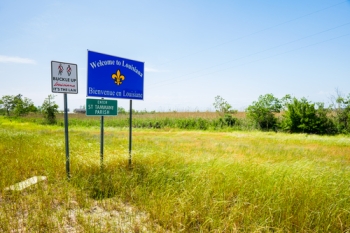California to Impose Fees on Crude by Rail Shipments
June 17, 2014 § Leave a comment
Perfect Compromise. Nobody’s Happy.
June 11, 2014 § Leave a comment
Colorado Governor John Hickenlooper’s compromise seems to have fueled the fire in the ongoing debate about fracking regulation, and more broadly about local versus state control. As noted in earlier posts, other groups including homebuilders join the oil and gas industry in its opposition to these measures.
Currently, 11 potential ballot measures are competing for interest-group money and Colorado voters. While some groups are looking to broadly ban fracking and other activities deemed unacceptable at the local government level, most are looking for more specific limitations on drilling. A central issue in the measures is the distance permitted between drilling rigs and homes. The state’s current regulations require a 500-foot buffer. Four of the proposals would increase setbacks for drilling rigs by distances from 1,500 feet to a half-mile–proposals that Hickenlooper recognizes would put the state’s economy at risk by eliminating almost 60% of drilling locations. Colorado has enjoyed an earlier economic recovery than many states in the union in large part because of the oil and gas industry.
Hickenlooper’s compromise attempts to find a middle ground but has effectively made no one happy. Although environmental groups argue the compromise proposal does not go far enough, his bill would permit local governments to enact health and safety standards more stringent than state rules, authorize local inspections of oil and gas sites, and authorize negotiation with operators for setbacks greater than 500 feet. While the “compromise” would allow drilling to continue, the measure imposes a level of uncertainty that could be untenable to companies as various measures imposed at the local level would likely trigger costly delays and legal appeals for companies.
“Compromise” Bill Further Divides Stakeholders in Colorado
June 6, 2014 § 1 Comment
Colorado Governor Hickenlooper announced a proposed bill to allow local governments to set rules on noise and drilling setbacks, now at 500 feet, and to impose “reasonably necessary” moratoriums on drilling permits. Under the bill, local jurisdictions could also inspect drilling sites for regulatory compliance and recover those costs. Proponents of the legislation believe that while local governments would have greater control, they would not be permitted to ban drilling activity outright or implement rules so restrictive that they impede activity. Oil and gas operators could appeal rules they consider too heavy handed with the local jurisdiction, and if they aren’t satisfied, appeal again to a district court. The appeal process, however, is costly and time consuming and could derail a project and undermine its economic feasibility.
Opponents of the bill come not only from petroleum industry but from the greater business community, including vocal support from the Clolorado Association of Homebuilders. Even if a compromise bill is passed, it won’t address Initiative 75, previously discussed here, which business groups consider the most damaging of the various questions that could come to a vote.
Victory for Oil and Gas–Jindal Signs SB 469 into Law
June 6, 2014 § Leave a comment
Louisiana Governor, Bobby Jindal signed SB 469 into law this morning, June 6, 2014. As previously noted in a previous post, this legislation will end a lawsuit again 97 oil companies for alleged environmental damage. “This bill will help stop frivolous lawsuits and create a more fair and predictable legal environment, and I am proud to sign it into law,” Jindal stated. “It further improves Louisiana’s legal environment by reducing unnecessary claims that burden businesses so that we can bring even more jobs to our state.” SLFPA-E is expected to challenge the measure in court. Stay posted for further updates.
Death Knell for Lawsuit Targeting 97 Oil Companies in Louisiana
May 30, 2014 § 1 Comment
 Legislation that will kill the controversial lawsuit filed by the Southeast Louisiana Flood Protection Authority-East (SLFPA-E) last summer against 97 oil companies for historic coastal damage is headed for final approval. The Louisiana House voted 59-39 to approve Senate Bill 469, a measure aimed at killing the lawsuit that Governor Bobby Jindal strongly opposed on the basis that it was as an illegal measure that overstepped the authority of SLPA-E. The legislation will block SLFPA-E and similar entities from filing future lawsuits of this kind and retroactively kill the pending lawsuit. The bill now goes back to the Senate for final review of the retroactive amendment and then on to Governor Jindal for signature.
Legislation that will kill the controversial lawsuit filed by the Southeast Louisiana Flood Protection Authority-East (SLFPA-E) last summer against 97 oil companies for historic coastal damage is headed for final approval. The Louisiana House voted 59-39 to approve Senate Bill 469, a measure aimed at killing the lawsuit that Governor Bobby Jindal strongly opposed on the basis that it was as an illegal measure that overstepped the authority of SLPA-E. The legislation will block SLFPA-E and similar entities from filing future lawsuits of this kind and retroactively kill the pending lawsuit. The bill now goes back to the Senate for final review of the retroactive amendment and then on to Governor Jindal for signature.
Background
The SLFPA-E lawsuit claims the loss of wetlands in its jurisdiction means levees and floodwalls must be built higher, resulting in a dramatic increase in their costs for building and maintaining levees and floodwalls.The lawsuit alleges that 97 companies should be liable for repairing the damage and helping to defray the cost of flood protection now and in the future.
SLFPA-E claims that most of the drilling and dredging that led to the loss of wetlands was performed under permits that required the companies to repair any environmental damage, and alleges that this was never done. (Arguably if this were true, action to enforce such permit conditions against the permitted company at the time would have been available, more effective and more protective of the environment).
SLFPA-E also claims that the companies violated the federal Rivers and Harbors Act by putting more stress on flood protection levees. The lawsuit also alleges that because the projects turned marsh into open water, the work increased the amount of storm surge that moves into the metro area during tropical storms and hurricanes. The suit claims that violates a principle of civil law called “servitude of drainage,” which prohibits one person from increasing the flow of water onto someone else’s property. In addition to coastal erosion, the lawsuit also alleges other oil industry impacts, including road dumps, watercraft navigation and impoundments.
SLFPA-E is a political subdivision created through amendment to the Louisiana Constitution in the aftermath of Katrina to provide flood protection for St. Bernard, Orleans and Jefferson parishes.
Attempts to amend or scuttle SB 469 were soundly defeated and the bill advanced with solid support.
Ohio Measure to Double Penalties for Pipeline Safety Violations Scuttled
May 24, 2014 § Leave a comment
A proposed provision to double penalties for pipeline safety violations failed to advance with Ohio Mid-Biennium Budget legislation. Ohio House Bill 483 had a provision to double penalties for safety violations when introduced in March. However, the version passed by the Ohio House of Representatives last month eliminated that section. Under current law, fines for each violation can range up to $100,000 per day, with a $1 million cap. The Ohio Senate passed the bill on May 21, 2014.
Between a Rock and a Hard Place for Louisiana Pipeline Operators?
May 24, 2014 § Leave a comment
Legislators in Louisiana are pushing for state control of interstate pipeline s once abandonment is approved by the Federal Energy Regulatory Commission (FERC). If Senate Bill 525 becomes law, the intrastate pipeline then would be subject to the Louisiana Public Service Commission, which would have the final say in whether the pipeline could be abandoned.
s once abandonment is approved by the Federal Energy Regulatory Commission (FERC). If Senate Bill 525 becomes law, the intrastate pipeline then would be subject to the Louisiana Public Service Commission, which would have the final say in whether the pipeline could be abandoned.
It is unclear how the bill’s sponsors intend to deal with the issue of effectively usurping federal jurisdiction over interstate pipeline safety by PHMSA, if the Commission does not approve abandonment. Under the bill, if the Commission does approve abandonment, the pipeline’s operators then would have to cover the costs of providing customers with alternate means to get natural gas. The bill would place an undue burden on pipeline companies who would be forced to continue to operate aging infrastructure under an uncertain regulatory structure with conflicting demands. The bill was drafted in response to Midla pipeline’s application for abandonment of an 87-year old pipeline, which supplies natural gas to residents in eastern parishes, and may have operated past the end of its useful life.
The bill also appears to ignore the safety issues central to abandonment. American Midstream Partners LP filed its request with the FERC to abandon its 1920’s vintage Midla Pipeline in order to ensure the safety of people and property along its route. In its application, Midla outlined compelling reasons for abandonment including the inability to use modern technology to detect and predict leaks on the pipeline. Despite the company’s efforts to maintain the pipeline, at some point the aging infrastructure has been irreparably impacted by time. Cultivation and erosion has whittled away depth of cover; floods on the Mississippi River have destroyed six of eight river crossings; and development, including two schools, a prison and a planned housing community, has encroached on the right-of-way.
Reports indicate that at the point the company made the decision to retire the Midla mainlines for safety reasons, efforts began in earnest to engage stakeholders in the process. American Midstream identified several alternatives for assuring that impacted customers would continue to receive gas service post pipeline abandonment. Rather than engage in this process, lawmakers want to force American Midstream’s hand, and in the process may be creating more serious problems than they hoped to solve.
